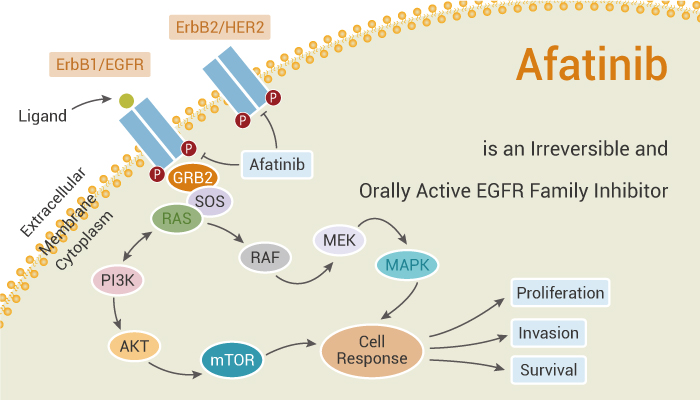The EGFR family of receptor tyrosine kinases (RTK) comprises four distinct receptors: the EGFR (also known as ErbB-1/HER1), ErbB-2 (neu, HER2), ErbB-3 (HER3) and ErbB-4 (HER4). These structurally related receptors are single chain transmembrane glycoproteins. And they consist of an extracellular ligand-binding ectodomain, a transmembrane domain, a short juxtamembrane section, a tyrosine kinase domain and a tyrosine-containing C-terminal tail. Binding of soluble ligand to the ectodomain of the receptor promotes homo- and heterodimer formation between receptors. Receptor dimerization is essential for activation of the intracellular tyrosine kinase domain and phosphorylation of the C-terminal tail. Phosphotyrosine residues then activate, either directly or through adaptor proteins, downstream components of signaling pathways.
The ErbB family of RTKs couples binding of extracellular growth factor ligands to intracellular signaling pathways regulating diverse biologic responses. Ten growth factors and their ErbB specificities are: EGF, AR, and TGF bind ErbB-1; betacellulin, and epiregulin bind both ErbB-1 and ErbB-4; the neuregulins NRG-1 and NRG-2 bind ErbB-3 and ErbB-4; and NRG-3 and NRG-4 bind ErbB-4. No known ligand binds ErbB-2.

Afatinib is an orally active, potent and irreversible dual specificity inhibitor of ErbB family (EGFR and HER2).
Afatinib (BIBW 2992) is an orally active, potent and irreversible dual specificity inhibitor of ErbB family (EGFR and HER2). Meanwhile, it blocks the signals of particular proteins that tell a cancer to divide and grow. In vitro, Afatinib effectively inhibits anchorage-independent proliferation of NIH-3T3 cells ectopically expressing EGFR mutants, and inhibits cell proliferation of H1666, H3255, and NCI 1975 cells. Besides, Afatinib sufficiently prevents heregulin-stimulated HER3 phosphorylation. So this can help slow down or stop the cancer growing. Therefore, Afatinib can be used for the research of esophageal squamous cell carcinoma (ESCC), non-small cell lung cancer (NSCLC) and gastric cancer. Based on the reported data, afatinib is not superior to erlotinib in treating EGFR-mutant NSCLC. However, afatinib was found to be more effective than erlotinib in treating advanced squamous cell carcinoma.
All in all, Afatinib is an orally active, potent and irreversible dual specificity inhibitor of EGFR and HER2.
References:
[1] Wieduwilt MJ, et, al. Cell Mol Life Sci. 2008 May;65(10):1566-84.
[2] Chen YC, et, al. BMC Cancer. 2021 May 3;21(1):495.